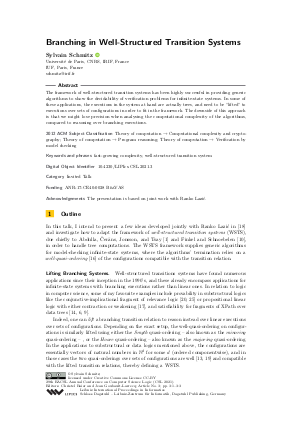@InProceedings{schmitz:LIPIcs.CSL.2021.3,
author = {Schmitz, Sylvain},
title = {{Branching in Well-Structured Transition Systems}},
booktitle = {29th EACSL Annual Conference on Computer Science Logic (CSL 2021)},
pages = {3:1--3:3},
series = {Leibniz International Proceedings in Informatics (LIPIcs)},
ISBN = {978-3-95977-175-7},
ISSN = {1868-8969},
year = {2021},
volume = {183},
editor = {Baier, Christel and Goubault-Larrecq, Jean},
publisher = {Schloss Dagstuhl -- Leibniz-Zentrum f{\"u}r Informatik},
address = {Dagstuhl, Germany},
URL = {https://drops.dagstuhl.de/entities/document/10.4230/LIPIcs.CSL.2021.3},
URN = {urn:nbn:de:0030-drops-134377},
doi = {10.4230/LIPIcs.CSL.2021.3},
annote = {Keywords: fast-growing complexity, well-structured transition system}
}

 Creative Commons Attribution 3.0 Unported license
Creative Commons Attribution 3.0 Unported license
